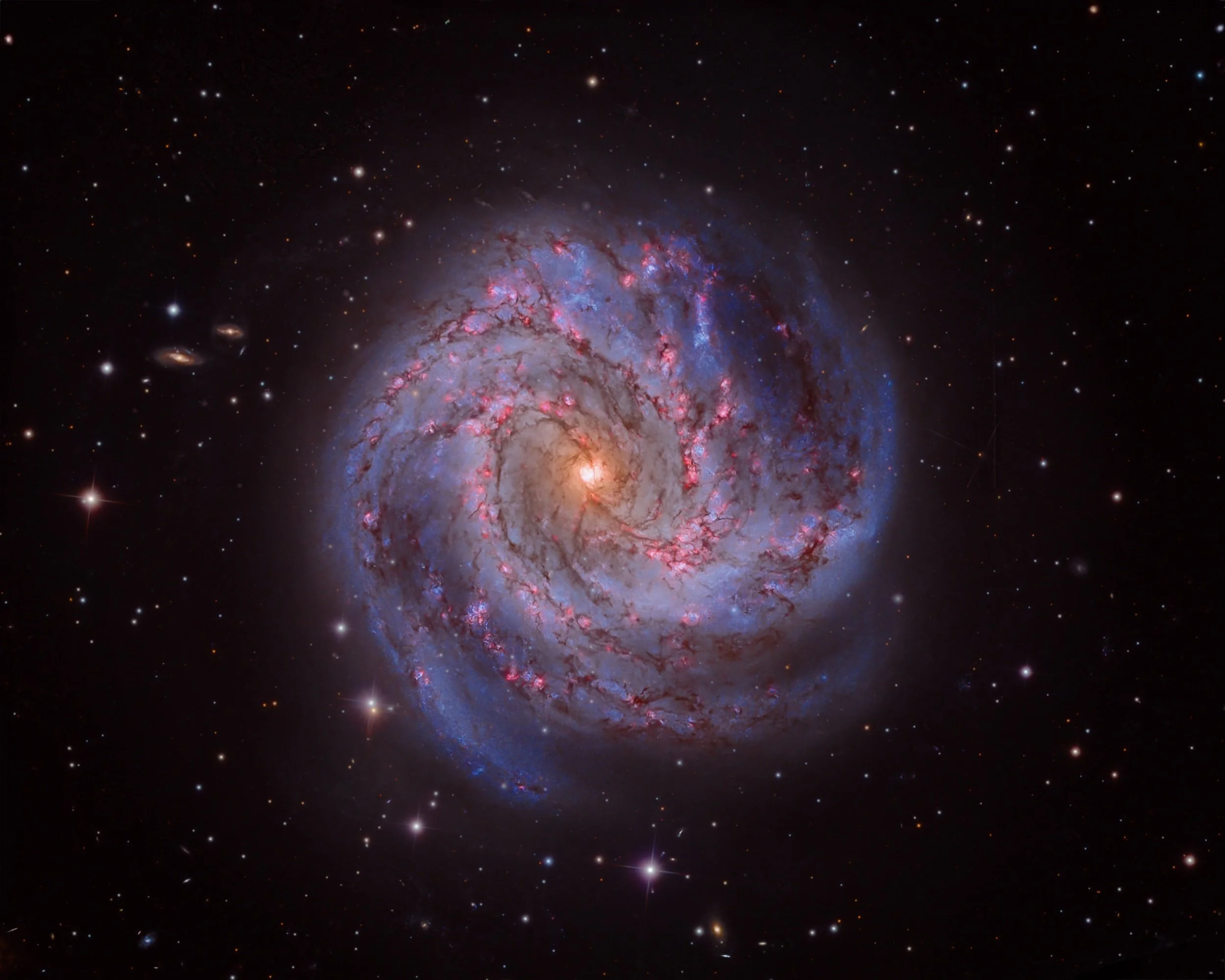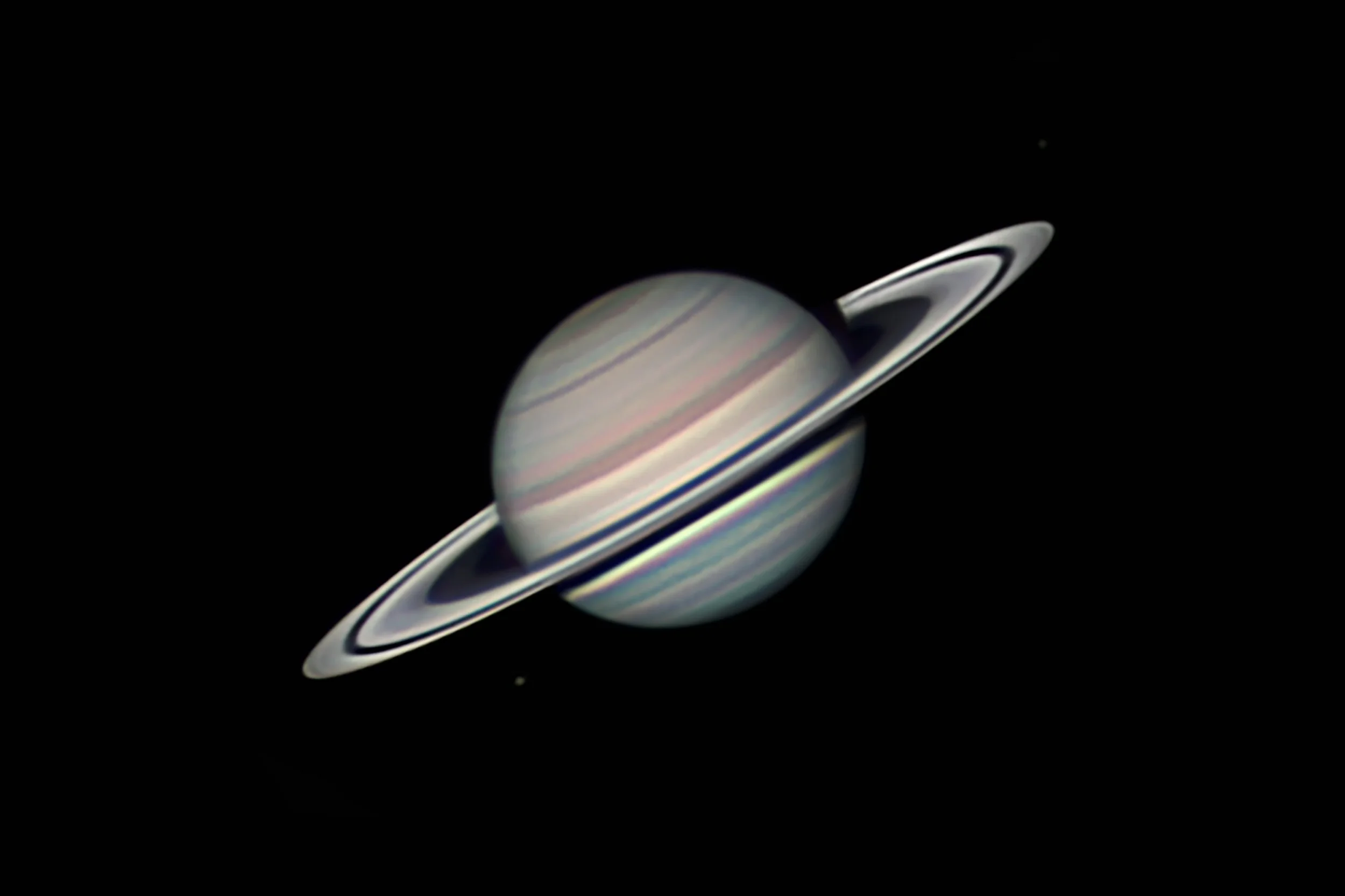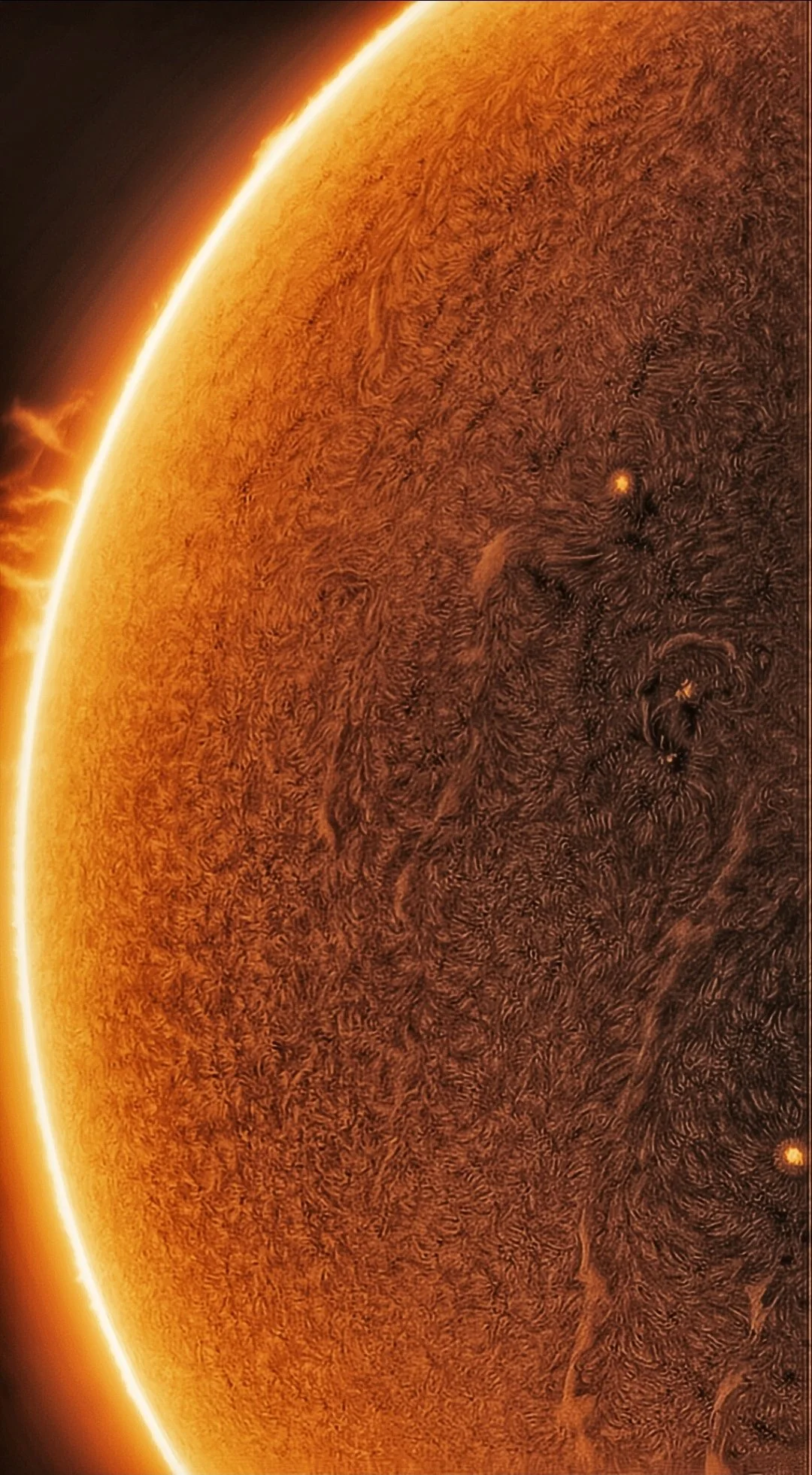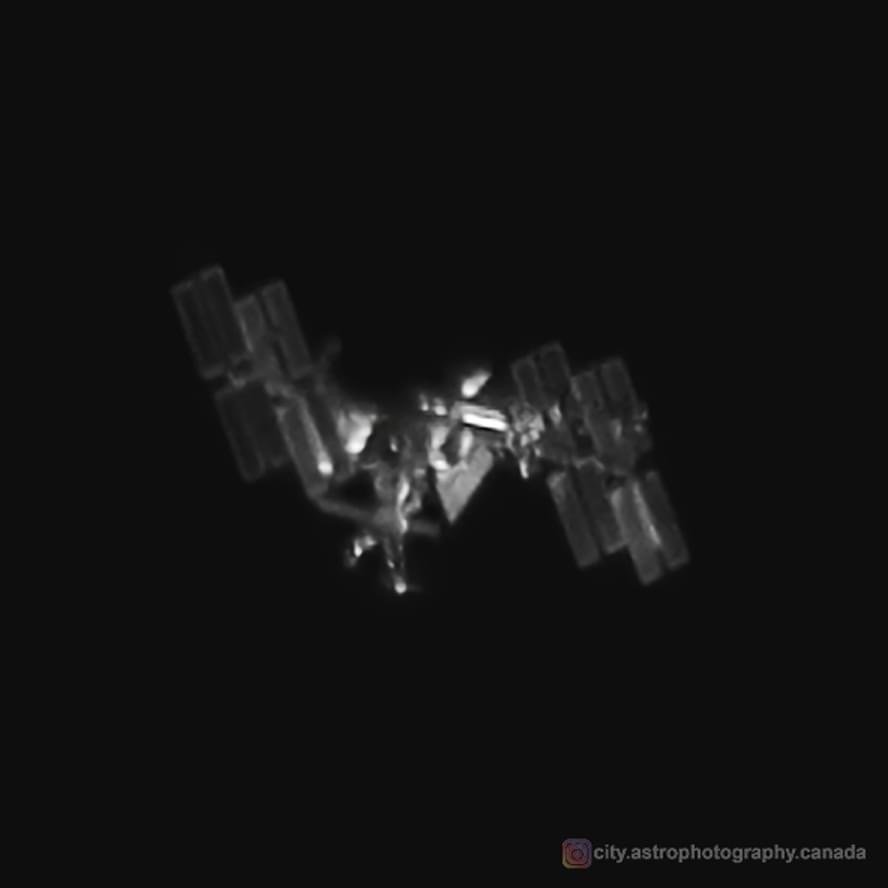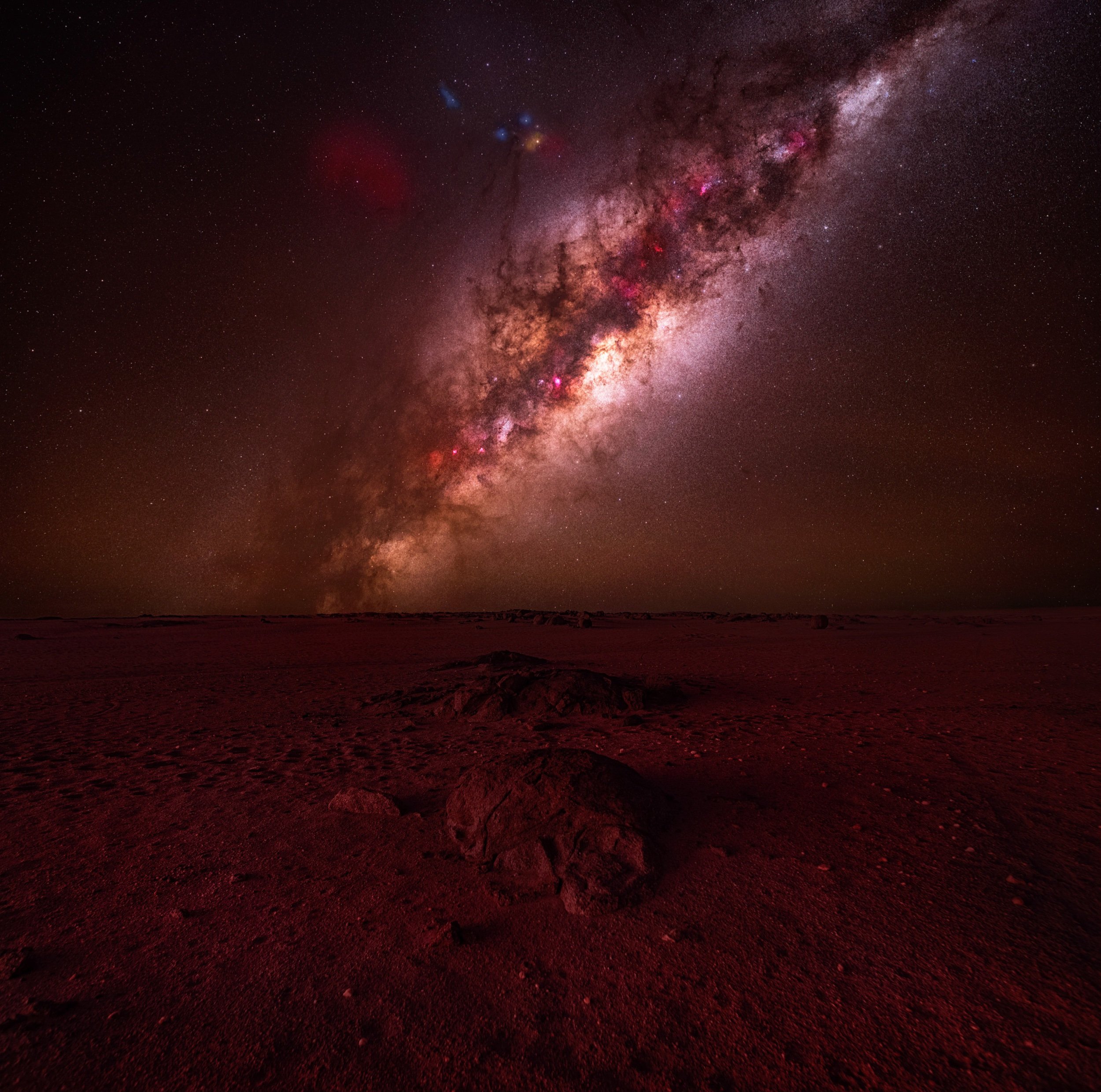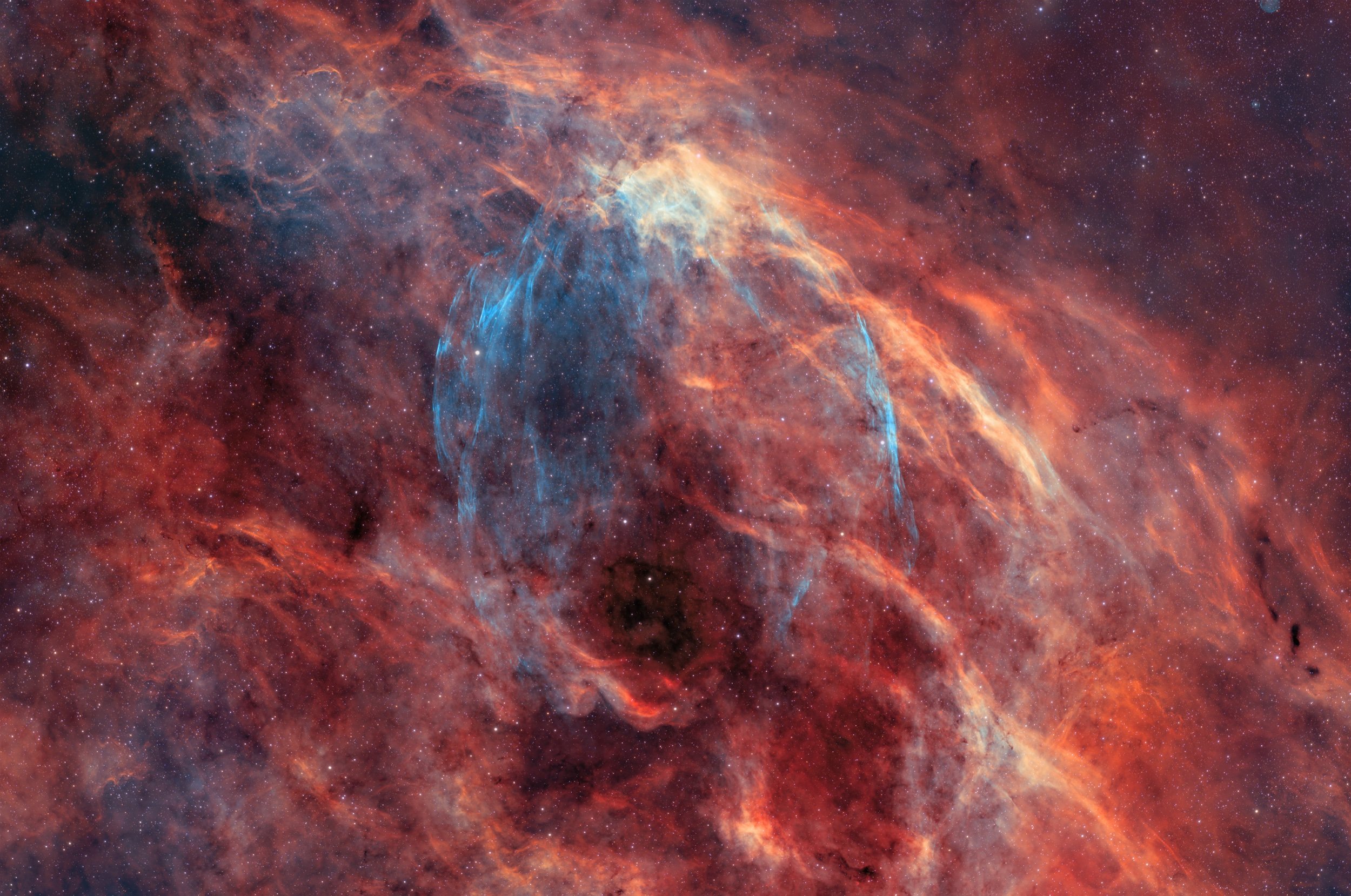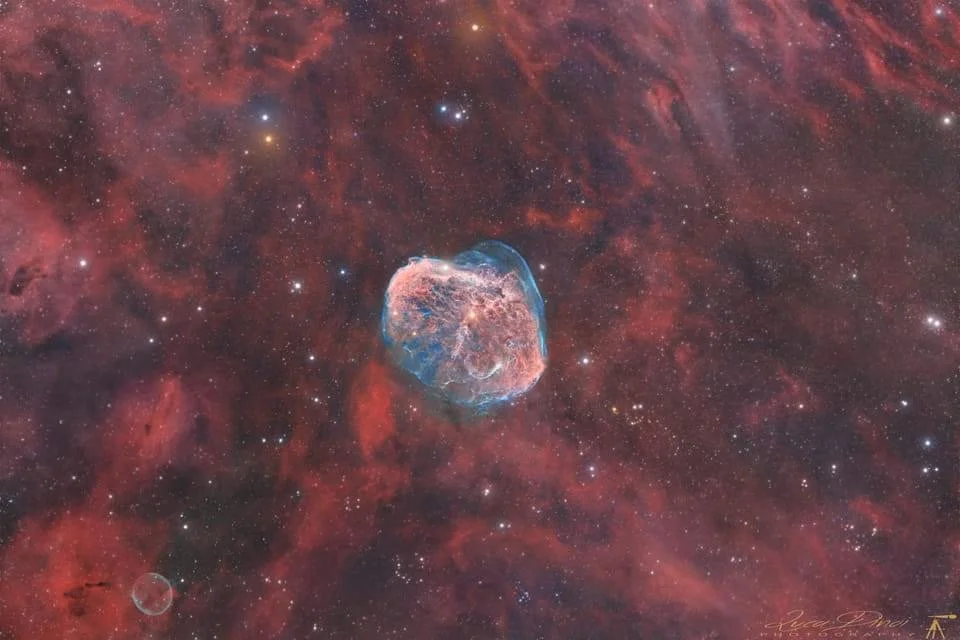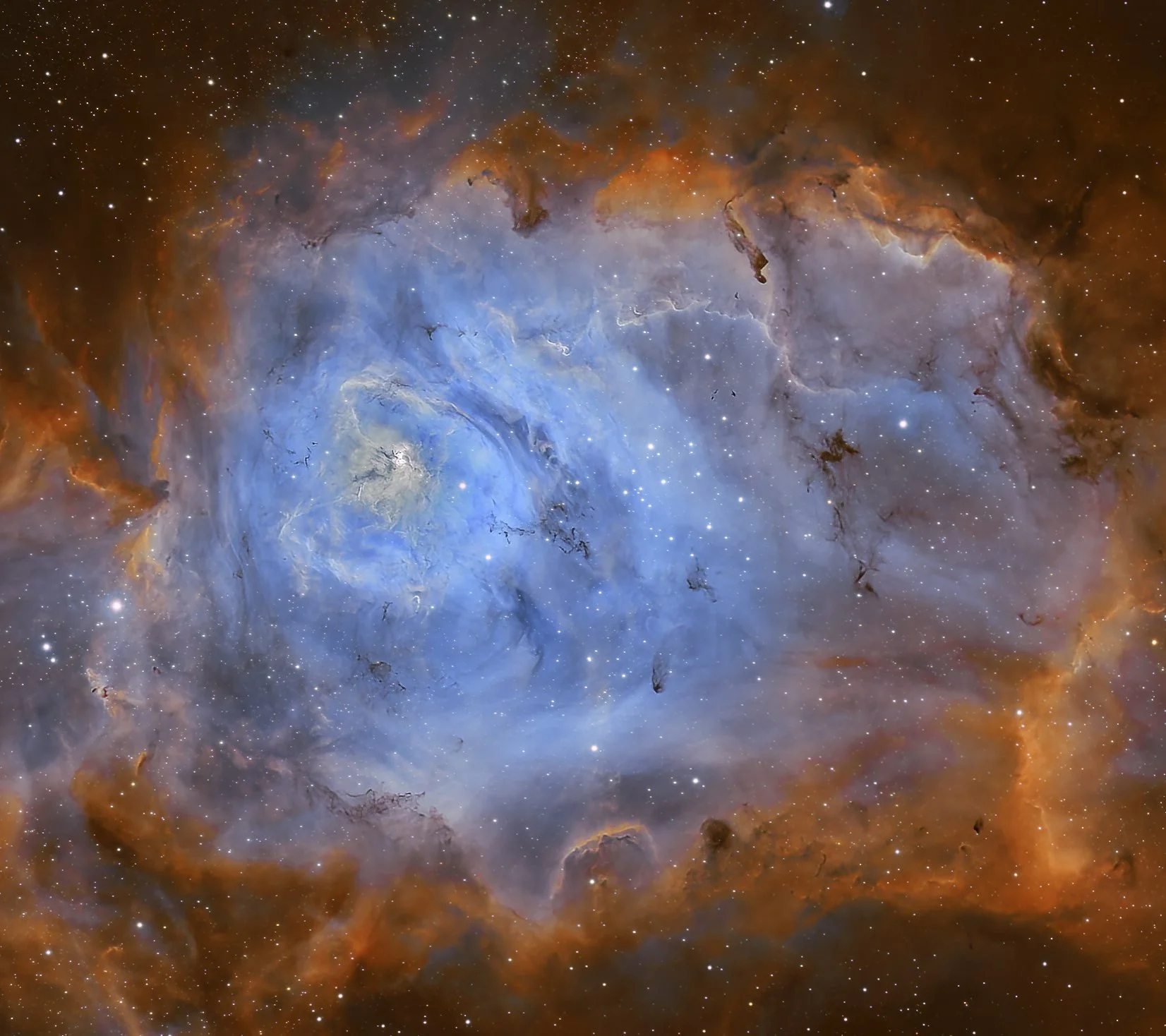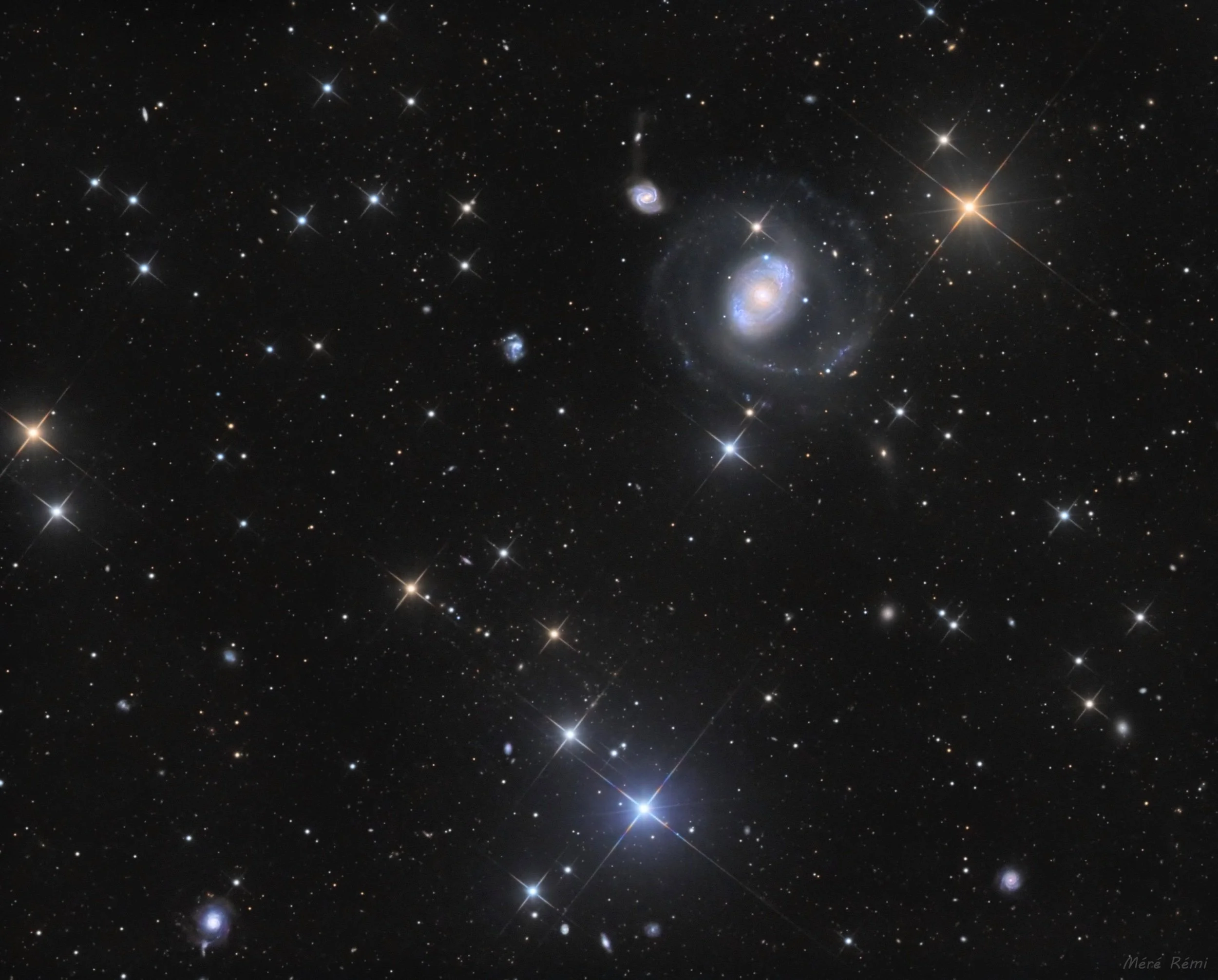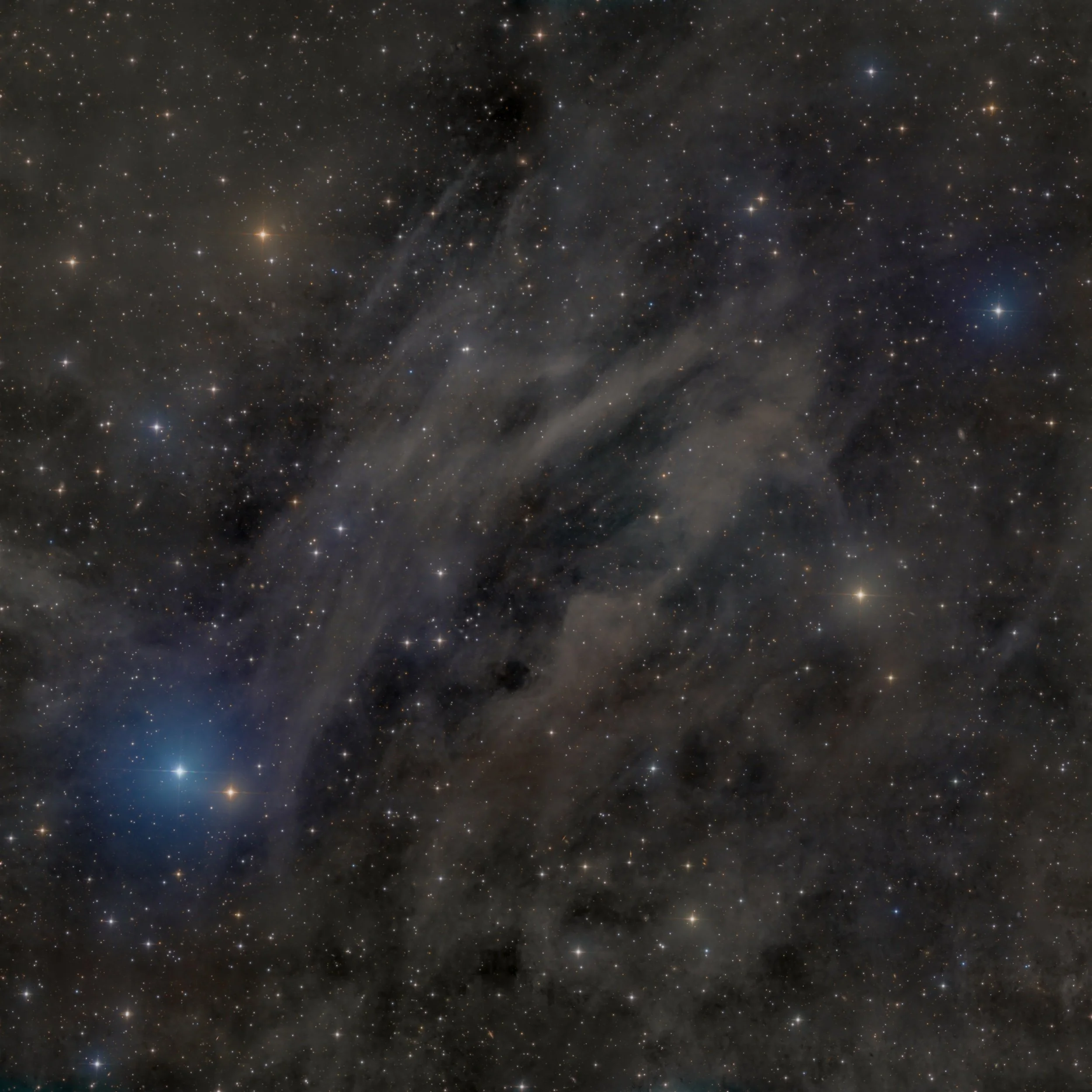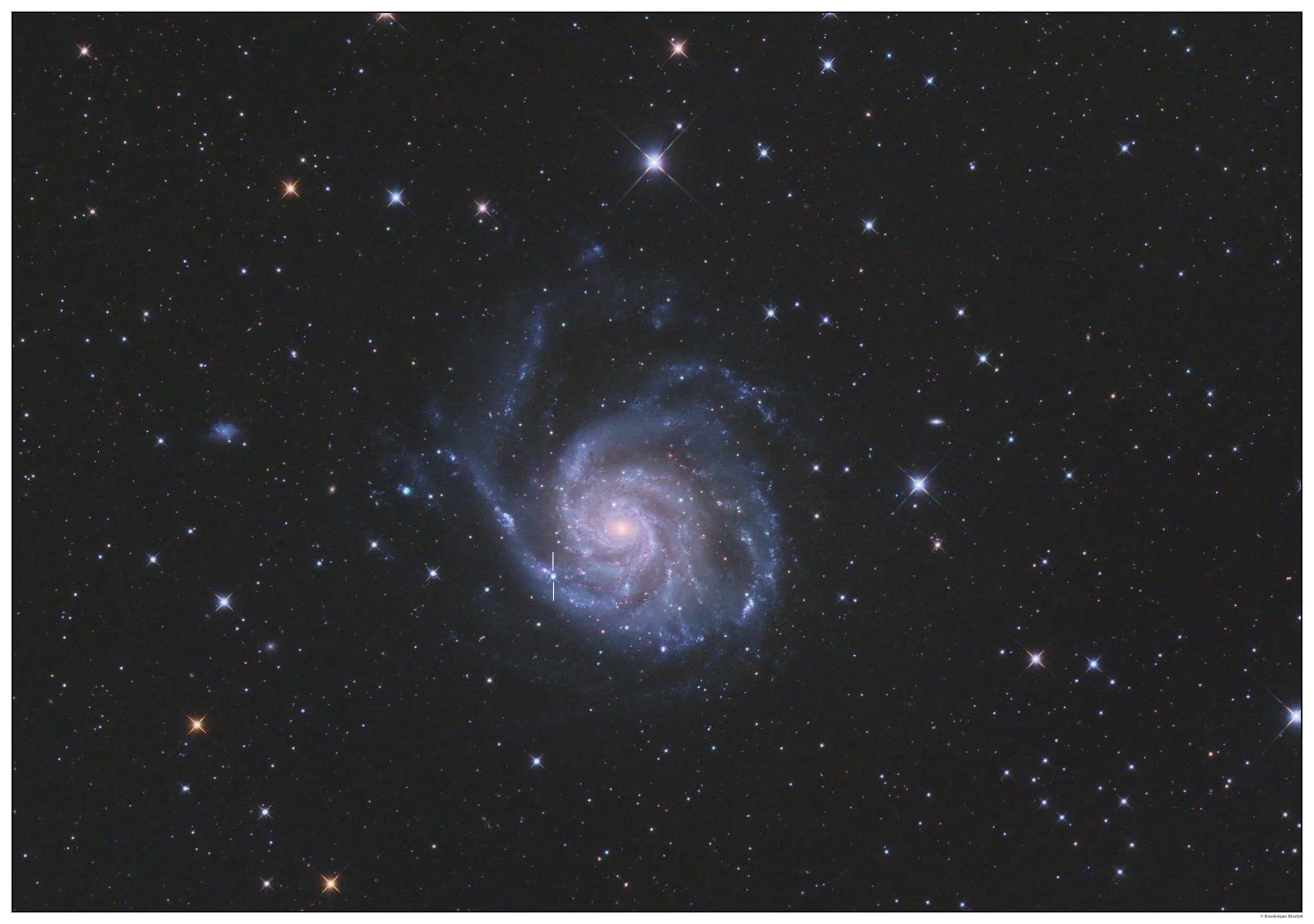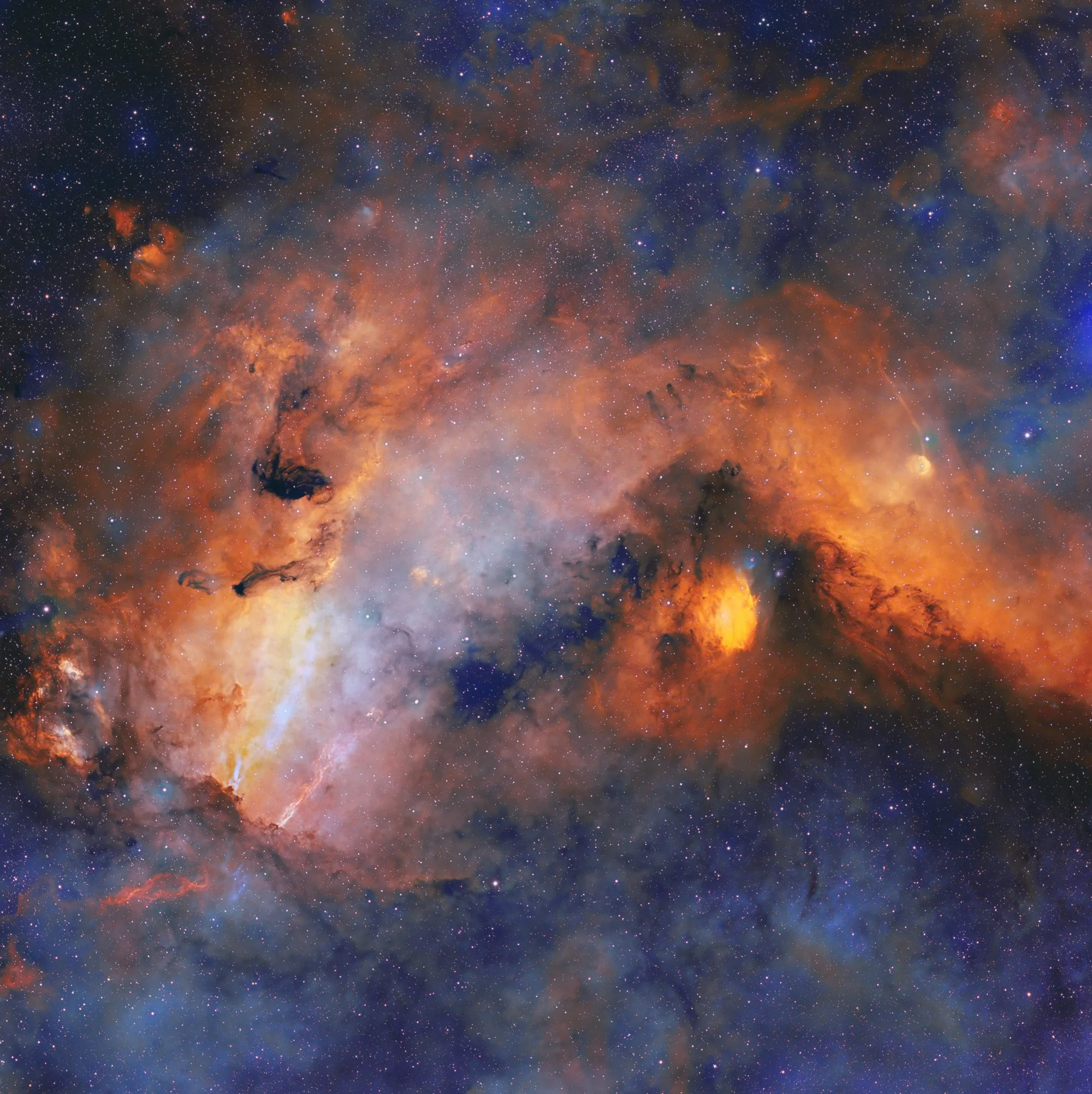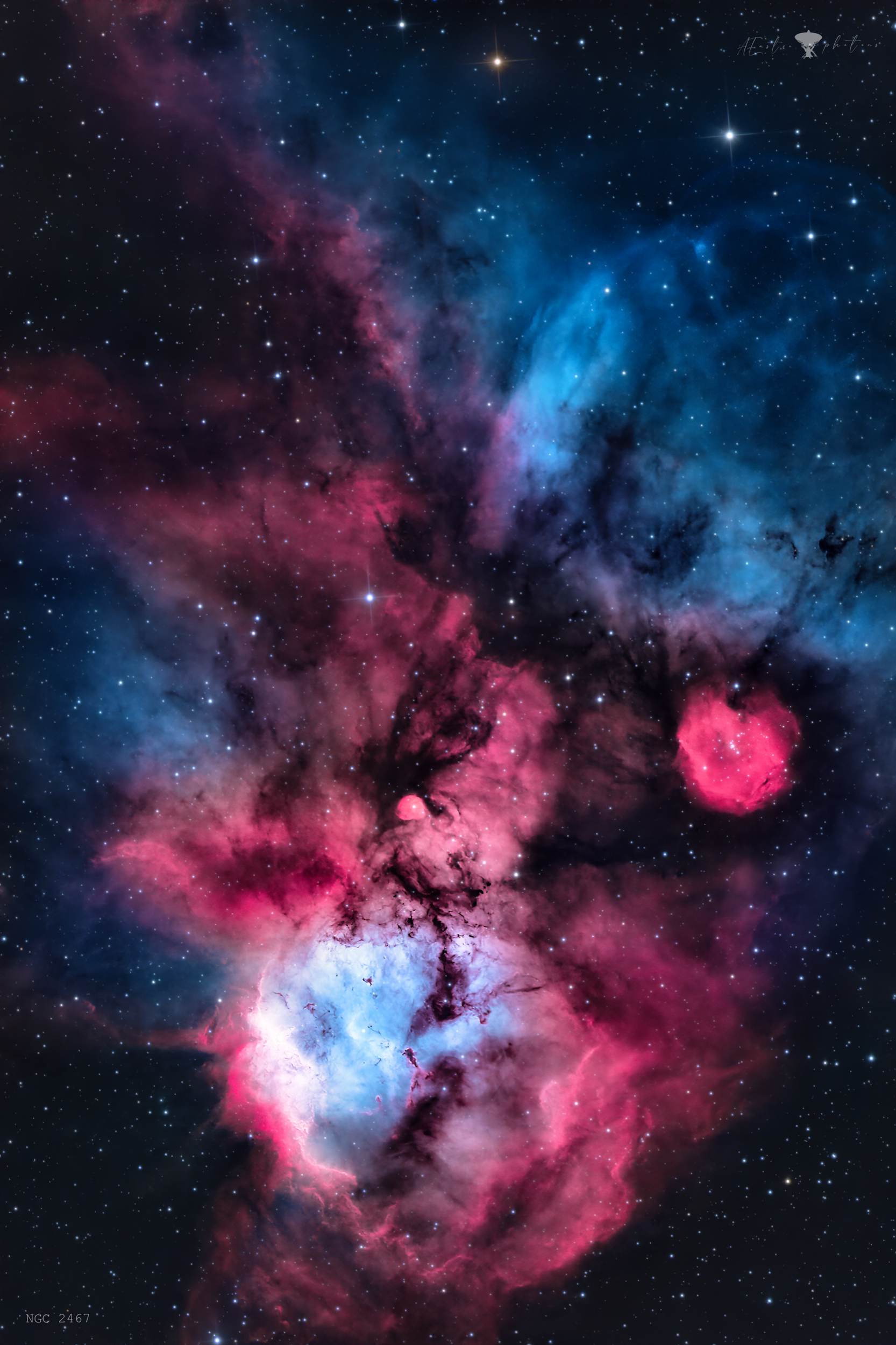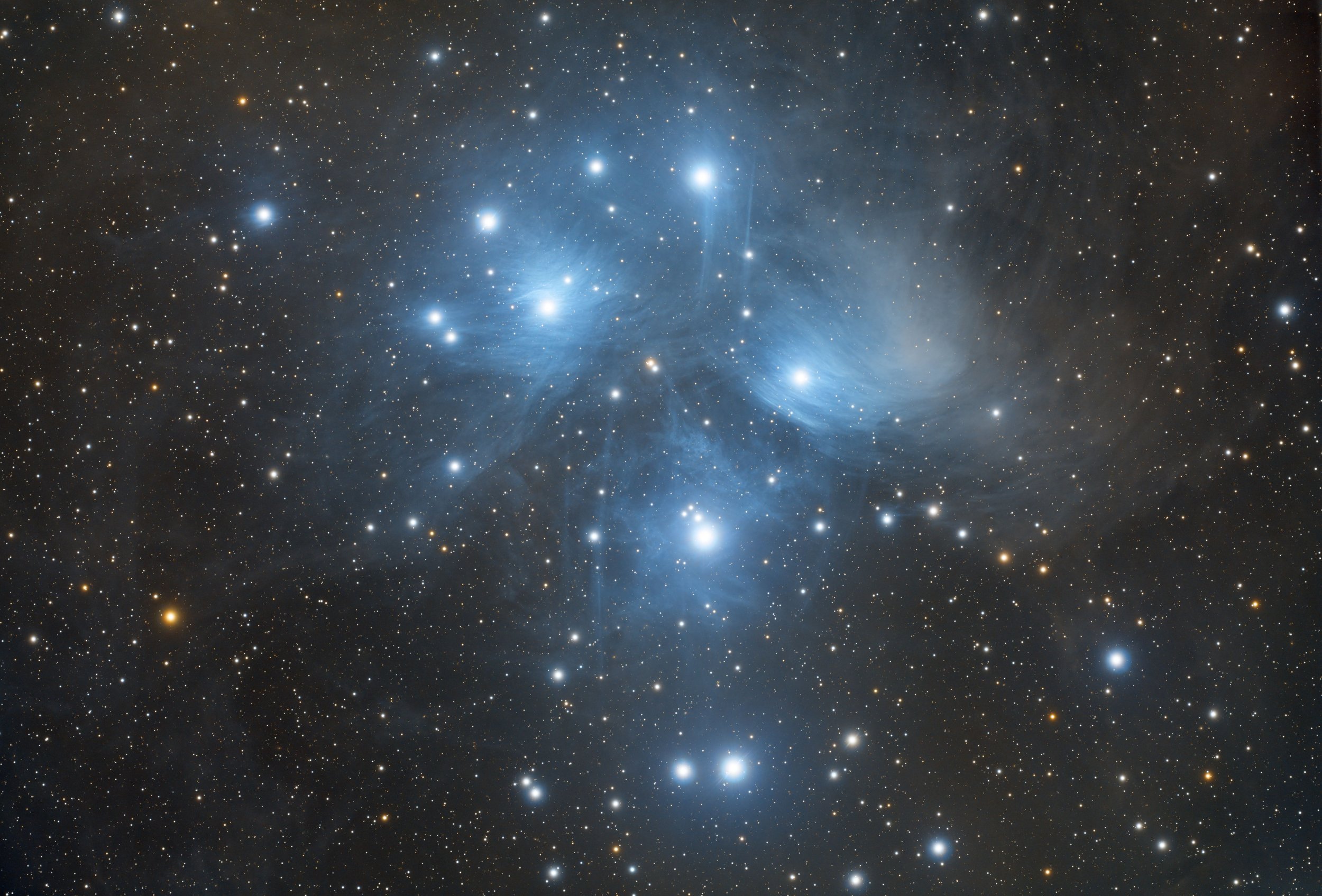
AAPOD2 Image Archives
M20 Trifid Nebula in HaRGB
The Trifid Nebula, a celestial masterpiece captured in the vast expanse of our galactic tapestry. Situated approximately 5,200 light-years away in the constellation Sagittarius, this mesmerizing nebula combines interstellar gas, dust, and the dazzling radiance of newborn stars to create a captivating visual symphony. Its name derives from the intricate filaments that divide the nebula into three distinct sections.
As new stars ignite within its vast expanse, the Trifid Nebula unveils the ongoing spectacle of stellar birth and evolution, captivating our imaginations and offering a glimpse into the captivating beauty of our ever-expanding universe.
M94
Image Description: Messier 94 (M94) is a spiral galaxy located in the constellation Canes Venatici. It’s about 16 million light years from us and has two rings. The inner ring structure is about 5,400 light years wide, and the outer ring is about 45,000 light years across. The outer ring contains more than 20% of the galaxy’s mass. There is a lot of star formation occurring occurring in this galaxy, particularly in the central region. There are numerous other little galaxies in the image, but I didn’t find any of them in the catalogues that I had readily available.
Tekkies:
Acquisition, focusing, and control of Paramount MX mount with N.I.N.A., TheSkyX and PHD2. Focus with Optec DirectSync motor and controller. Equipment control with PrimaLuce Labs Eagle 3 (2021) and 4 (2023) Pro computer. All pre-processing and processing in PixInsight. Acquired from my SkyShed in Guelph. Average transparency and seeing. Data acquired May 24-29, 2023 in a nearly moonless sky.
Luminance: Sky-Watcher Esprit 150 f/7 refractor and QHY600M camera with Optolong UV/IR filter
Chrominance: Takahashi FSQ-106 ED IV @ f/5 and QHY367C Pro one-shot colour camera with Optolong UV/IR filter
231 x 5m Lum = 19hr15m
234 x 5m chrominance = 19hr30m
Total: 38hr45m
Copyright: Ron Brecher
DeHt 5 - VdB152 - LDN1217
Image Description and Details : This is a very exciting area in Cepheus. The image contains several interesting objects, the most prominent being filaments of a super nova remnant (SNR110.3+11.3), a planetary nebulae (Dengel-Hartl-5), a reflection nebula (VdB152) and a dark nebulae (LDN1217). Most of the area is also streaked by faint dust lanes partially obscuring the objects.
All exposures are unguided 120s at f/2 and binned 1x1. A dynamic combination of Ha and Oiii was used. Image is cropped.
26h Ha
14h Oiii
3*1h RGB
Equipment:
Scopedome 3M
Celestron EdgeHD 14" with Hyperstar Lens
ZWO asi6200mm
Chroma 3nm
10Micron GM3000 HPS II
Captured from E-eye, Spain during April and May 2023.
Copyright: Sven Eklund
M83 -The Southern PinwheEl
Image Description and Details : Image captured from Observatorio El Sauce, Chile
Telescope: Planewave CDK24
Camera: Moravian C3-1600 PRO
Luminance: 21 x 10mins
Red: 16 x 10mins
Blue: 18 x 10 mins
Green: 18 x 15 mins
Ha: 21 x 15mins
Total Integration: 17:55 hours
Processed with PixInsight and Photoshop
Captured by Martin Pugh
Processed by Neil Corke
Copyright: Neil Corke & Martin Pugh
Cosmic monster CG4 and surrounding
Image Description and Details : CG4 means “Cometary Globule #4” and is a complex of nebulosity and dust with a very peculiar shape (it looks like a concentrate of comets) located in the southern constellation of Poppa. The “head” of the galactic worm has dimensions of about 1.5 light years, while the offshoot that follows the head and which is directed in the opposite direction with respect to the rest of the famous Vela supernova (which is at the center of the huge GUM nebula), it has a length of about 8 light years.
The complex was photographed during ShaRA#4 project; this is a composition of 3 different images in wide field taken with the T3 from Chilescope Service (a very fast 500m f/3.8 Newtonian), processed by Christian Privitera, Andrea Iorio and me (Alessandro Ravagnin). RGB composition, total 2 hours of integration.
Copyright: ShaRA Team
Saturn with Tethys and Enceladus
Image Description and Details : 13 x 90 sec IR and RGB video captures of Saturn (~ 1 hr) were made under very good seeing conditions.
The narrowing of the rings since last year is very clear, so it is pleasing to see a hint of the Encke Division. The Southern Hemisphere is more active than the north, as it receiving more sunlight than before and a particularly large system is evident in the STrZ to the p side of the Central Meridian. The colours of this region that have emerged as the planet's tilt allows a better view are astonishing and beautiful. I have not altered these in any way, save for a balancing of the histograms.
The moons Tehtys (left) and Enceladus (right) were close to the planet and some time later Tethys and its shadow transitted the southern Hemisphere of the planet.
OTA: C14 EdgeHD
Camera: Player One Saturn-M SQR
Mount: PME II
Filters: Chroma RGB
Barlow: Tele Vue 2X
Copyright: Copyright: Niall MacNeill
ngc3384
Image Description and Details : NGC 3384 is a Lenticular galaxy in the popular M96 group in Leo. It is a part of a trio of galaxies that include Elliptical Galaxy M105 (NGC 3379) and Spiral Galaxy NGC 3389.
All of these are a part of the Leo galaxy group.
In my image, NGC 3384 is the oval galaxy in the left center, with the circular M105 (NGC 3379) to the right of it. NGC 3389 is the blue galaxy to the bottom.
OTA: Celestron 11" Edge HD with .7x Focal Reducer (1960mm FL f/7)
Mount: iOptron CEM120
Camera: ZWO ASI2400MC Pro (full frame)
Gain: 158
Cooling Temperature: -10 degrees celsius
Filters:
Chroma L 180s x 59
Chroma R 180s x 20
Chroma G 180s x 41
Chroma B 180s x 42
8 hours total total acquisition time
Auto-guiding: ZWO ASI174MM Mini and ZWO OAG-L
Auto-focusing: 2" BDS-RT Baader Diamond Steeltrack Focuser and ZWO EAF
Control: ZWO ASIAIR Pro
Calibrated in Astro Pixel Processor with flats, darks and dark flats
Processed in Pixinsight and Lightroom
Location: Bortle Class 2 skies outside Flagstaff, Arizona
Copyright: Drew Evans
ISS
Image details:
This is probably my 7th trial on shooting ISS from my backyard this year. The previous trials were not good at all due to wrong exposure, out of focus, bad tracking, thin clouds, wrong settings in camera.... etc
This time I tracked it reasonably well during the clear evening when it passed by.
If it happens again I think I can do even better.
It is tracked manually through a 14" Dobsonian.
Date: May 28, 2023
Time: 9:20pm
Max. Altitude of ISS: 62 degrees
Scope: Sky-watcher 14" SynScan Dobsonian (Tracked manually by hand)
Shutter: 0.5ms, 210gain
Camera: Apollo M-Max
Barlow: Televue 3X barlow
Filter: None
Software: FireCapture, Imppg, Photoshop
Copyright: Benjamins Astrophotography Hub
The red zone
Image Description and Details : Nikon z6 mod
Sky: 120sec x 6 iso 800 f2.2 tracked) ioptron sky guide pro
Foreground: 15sec iso125 (twilight)
Location: Gobabeb Namibia
Copyright: Keith Levins
W63 (SNR G082.2+05.3) in Cygnus
Image Description and Details : W63 (SNR G082.2+05.3) is a faint Supernova Reamnant in the constellation of Cygnus.
On the top right part of the image we can find the planetary nebula NGC 6884 with an Oiii envelope very visible.On the very top right, we can find StDr 139.
Takahashi FSQ-106EDX4
ZWO ASI2600MM
ProSky-Watcher EQ6
ProAntlia LRGBHO 3nmHa: 159×600″(26h 30′)
Oiii: 131×600″(21h 50′)
R: 20×180″(1h)
G: 20×180″(1h)
B: 20×180″(1h)
Clear skies
Copyright: Team Atlaskies
Ngc6888 and Soap Bubble
Image Description and Details : NGC 6888 Crescent nebula and Soap Bubble
Tecnosky APO Triplet 115/800
Omegon veTec 571 M
iOptron CEM70G
Filters
Optolong Blue 2" Optolong Green 2" Optolong H-Alpha 3nm 2" Optolong Luminance 2" Optolong OIII 3nm 2" Optolong Red 2" Optolong SII 3nm 2"
Accessories
Primaluce Lab SESTO SENSO 2 WandererAstro WandererBox Ultimate V2 WandererAstro WandererCover V3 WandererAstro WandererRotator Mini
Software
Adobe Photoshop Han K. Astrometric STAcking Program (ASTAP) iOptron ASCOM Driver and Commander Pleiades Astrophoto PixInsight Stark Labs PHD Guiding Stefan Berg Nighttime Imaging 'N' Astronomy (N.I.N.A. / NINA)
Guide telescopes and cameras
Omega 90/500
Omegon veLOX 224 C
poses:
Optolong Blue 2": 19×300″(1h 35′)
Optolong Green 2": 19×300″(1h 35′)
Optolong H-Alpha 3nm 2": 26×600″(4h 20′)
Optolong Luminance 2": 31×300″(2h 35′)
Optolong OIII 3nm 2": 23×600″(3h 50′)
Optolong Red 2": 19×300″(1h 35′)
Integration:
15h 30′
Copyright: Luca Dinoi
Dragon Egg Nebula
NGC 6164 (sometimes referred to as the Dragon Egg) is a bipolar emission nebula spanning around 4 light-years across. It is situated 4,200 light-years away in Norma.
Its symmetric gaseous shroud and faint halo surround the blue, young, central star HD 148937, the brightest member of a triple star system orbiting around each other, from which powerful stellar winds moving around 8 million kilometers per hour created the nebula.
The hot, luminous O-type star is some 40 times more massive than the Sun and only 3 to 4 million years old. In another 3 to 4 million years the massive star will end its life in a supernova explosion.
NGC 6164’s bipolar symmetry, as well as its extensive halo makes it similar in appearance to a planetary nebula but it is not. Expanding into the surrounding interstellar region the material in the halo is probably from an earlier gas burst from the central star, about 4000 years ago.
Imaged in Ha OIII and RGB on our Planewave CDK 700 at Observatorio El Sauce, Chile.
Image Processing: Mike Selby
Unnamed nebula near NGC 6250
Years ago I did NGC 6250 with 12" scope, now just recently I looked at this image and saw that there is a quite interresting nebula just a few arcminutes from the open cluster.
I did this one with the 24" last night just as a test to see if it is really interresting.
The exposure time was a rather short LRGB 60 45 45 45 min.
Copyright: Wolfgang Promper
M8
Image Description and Details :
It is a core of M8 Lagoon Nebula, which was acquired during 11 nights of the month of May, from Maringá Brasil.
Obtained with a
Telescope Stellarvue 80 ED Raptor
Filter SHO - Astronomik 12nm
Camera ASI294mm Pro
Mount Sky Watcher Neq6
Capture N.I.N.A.
Processing Pixinsight - Topaz
Sky Bortle 6
It has a total of 15hs 32min for acquisition, but I selected between the best 21hours of exposure.
From Maringa Brazil
When I saw the result I saw that it looks like an ice lagoon surrounded by fire, hence the name I gave to this photo
Copyright: Marcelo G Salemme - Astromgs
Sh2-73
Image Description and Details : Sh2-73is located in the constellation Hercules and was mistakenly included in the Sharpless catalog as an emission nebula.We now know that the nebula is simply a molecular cloud. With its relatively high galactic latitude, about 45°, the integrated light of the galaxy illuminates the nebula.
Astrosib RC 20" + camera FLI Kepler 4040
Total RGB=28h15mn
The skyX + ccdautopilot + APP + Pixinsight +Photoshop
Form E-eye (Fregenal de la Sierra,Spain)
Copyright: Georges Chassaigne
M101 supernova
Cropped image of M101 image of last night, with bright supernova 2023ixf (discovered in Japan on May 19th). The supernova is indicated between two line segments. The sky was not really good, with high thin clouds present during the 2 hour exposure with Takahashi Epsilon 160ED.
Copyright: Dominique Dierick
M24
Image Description and Details : M24, also known as the Small Sagittarius Star Cloud, is a large star cloud in the constellation of Sagittarius. It is located about 10,000 light-years from Earth and has an apparent magnitude of 4.6. M24 is about 600 light-years wide and lies in the Sagittarius Arm of our galaxy, the next inner spiral arm to our own.
The star cloud is visible to the naked eye as a large, hazy patch in the Milky Way. Binoculars and small telescopes reveal a dense concentration of stars, including many young, bright stars. M24 is also home to a number of open clusters, including NGC 6603.
The physical composition of M24 is dominated by hydrogen and helium, with trace amounts of other elements. The average temperature of the gas in M24 is about 10,000 degrees Kelvin. The stars in M24 are mostly young and hot, with a few older, cooler stars. The open clusters in M24 are about 100 million years old. A detailed examination of the image reveals the full life cycle of stars. Supernova remnants, gas clouds, and condensing dark nebulae are scattered across this narrowband vista, providing a glimpse into the birth, life, and death of stars.
Tech:
Takahashi FSQ @ f/5
FLI Proline 16803
5nm Ha and OIII filters
10 x 1800s exposure each color channel. Ha assigned to red. OIII assigned to blue
MaximDL, Astro Pixel Processor, Croman StarX, Photoshop
Coonabarabran, NSW, AUS
Copyright John P. Gleason
NGC 2467 - Skull and Crossbones Nebula
Image Description and Details :
Known as the "Skull and Crossbones Nebula", NGC 2467 is an extremely active stellar nursery that glows in deep reddish tones and is located within the constellation Puppis. Numerous stars and clusters come together to make this stunning stellar portrait. Among numerous gems in the region, dust lanes and dark globules mark sites of future star formation. One of the most notable clusters within NGC 2467, known as Haffner 18, houses around 50 stars. The NGC 2467 complex lies about 17,000 light-years away.
Photographed in narrowband emission (H-alpha & O-3) at El Sauce Observatory, Rio Hurtado, Chile, during May 2023.
Clear skies,
A.
Copyright: @ae_astrophotons
Scope: Planewave CDK 24”
Filters: H-alpha & O-3
Integration: 5h
Country: El Sauce Observatory, Rio Hurtado, Chile (T-Live)
Date: May 2023
Copyright: Copyright: @ae_astrophotons
